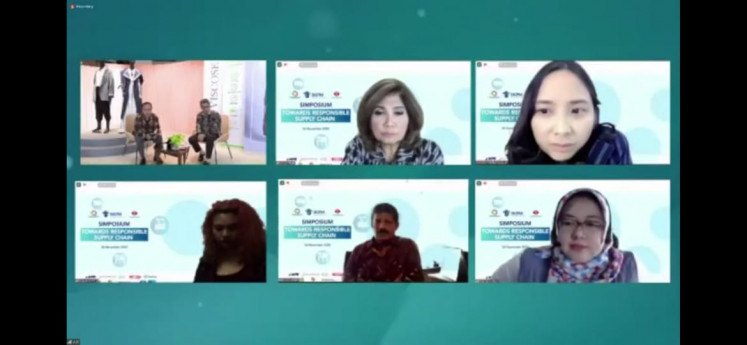Popular Reads
Top Results
Can't find what you're looking for?
View all search resultsPopular Reads
Top Results
Can't find what you're looking for?
View all search resultsMulti-stakeholder cooperation key to improve sustainable textile supply chain
Change text size
Gift Premium Articles
to Anyone
T
he textile and textile products industry has contributed significantly to Indonesia’s economic growth by boosting national foreign exchange reserves and employing a significant share of the country’s workforce.
Statistics Indonesia (BPS) data shows that the textile and textile products sector raised between US$12 billion and $13 billion and employed more than 1.5 million workers per annum.
According to data from the Industry Ministry, the sector contracted 8.37 percent in the second quarter of 2020 as a result of a decline in domestic consumption and exports.
Yet in the third quarter, the sector bounced back to 2.97 percent growth, according to ministry data.
Data from Omnilytics indicated that the bounce back was thanks to retailers’ and consumers’ rapid shift to online marketplaces for textile purchases.
In the fast-moving fashion and textile industry, most local and global consumers have also been demanding responsibly produced textiles and textile products, specifically biodegradable rayon fiber.
To meet the demand, Indonesian textile and textile product companies have formed a tight, multi-stakeholder cooperative effort so that Indonesia can achieve national sustainable fashion and global recognition by seizing certain opportunities and tackling certain challenges.
This is a summary of an online symposium called Towards Responsible Supply Chain, organized by the Indonesia Textile Association (API) on Nov. 26.
Living up to its promise to highlight stakeholder cooperation, the event featured panelists from different backgrounds related to the textile industry, representing policymakers, think tanks, producers, suppliers and end-users.
The speakers included the Industry Ministry’s leather textile and footwear director general Elis Masitoh, PT Asia Pacific Rayon (APR) director Basrie Kamba, API chairman Jemmy Kartiwa Sastraatmaja, Institute for Development of Economics and Finance (INDEF) senior researcher Aviliani, Indonesian Convection and Textile Factory chief executive officer Michelle Tjokrosaputro, Asia Pacific Fibres president director Ravi Shankar and H&M Indonesia regional sustainability manager Anya Sapphira.
The discussion was moderated by Royston Advisory Indonesia managing partner Affan Alamudi.
The first challenge is to bolster local rayon fiber production so that Indonesia can attain raw material sovereignty, all the while exporting the fiber abroad, instead of just importing less sustainable raw materials.
According to Basrie, this is quite essential because the global textile and fashion industry is now demanding sustainable raw material alternatives, under the new circular economy model.
The ministry also recognizes the same trend. “The global demand for an ecologically friendly textile production process has become an inevitability. Thus, we must push for the development of biodegradable and renewable rayon fiber use,” wrote Industry Minister Agus Gumiwang Kartasasmita in a keynote address for the event. The address was read by a ministry officer representing Agus.
In addition to demanding biodegradable textiles, Basrie said, the global fashion and textile industry would supply their materials only from factories that ran their operations responsibly, in terms of waste management, workers’ welfare and efficient water use.
Basrie added that the local textile businesses needed to balance these responsible operational elements with high productivity to be on par with other global players.
Jemmy, meanwhile, urged stakeholders to address Indonesia’s high levels of textile imports.
“To strengthen the domestic sustainable textile market, we also need to control our import of textile products. Our high textile imports have already impacted our textiles and textile products, as well as the overall trade balance quite negatively,” he said.
Agus continued in his note that the ministry had set its sights on substituting 35 percent of imported textile materials with locally produced ones by 2022, focusing on ecofriendly raw materials.
“We are offering tax holidays for investors who inject the local textile sector with capital amounting to more than Rp 500 billion (US$35.5 million). We also offer other types of incentives for investors,” Elis said.
The ministry is also conducting a sustainable fashion campaign targeting both producers and consumers to demonstrate its support for the circular economy.
The second challenge is to strengthen local textile and textile production bases, not only by using state-of-the-art machinery but also by training workers to be able to operate these machineries in keeping with the Industry 4.0 era.
For instance, to pursue a value-added textile supply chain in Indonesia, the ministry has launched the Indonesian Smart Textile Hub, giving various industry players real-time data on the industry, covering mainstream to downstream aspects through cutting-edge digital technology.
According to Elis, the new platform primarily seeks to improve the textile ecosystem, focusing on making export activities easier.
Basrie, meanwhile, added that the APR had also adopted a blockchain-based supply chain traceability platform in order to monitor the impact of responsible production along its entire supply chain.
Basrie said that automating some of the textile industry’s operations did not mean the industry would lay off workers. This was where training workers to go beyond technical skills and to embrace business skills had become important, he said.
Meanwhile, Aviliani reminded policymakers of some homework that they needed to do to push Indonesia’s sustainable textile industry even further.
“I applaud the ministry’s incentive policies. Yet most of the incentive policies that the ministry has rolled out were formulated in consideration of the supply side only, without really targeting consumers on the demand side,” she said.
All the panelists in the symposium have agreed to intensify their interdisciplinary collaboration to push for a more sustainable textile industry going forward, recognizing the Regional Comprehensive Economic Partnership as a great opportunity to link up with various business entities and stakeholders abroad who can support local players in their efforts.











